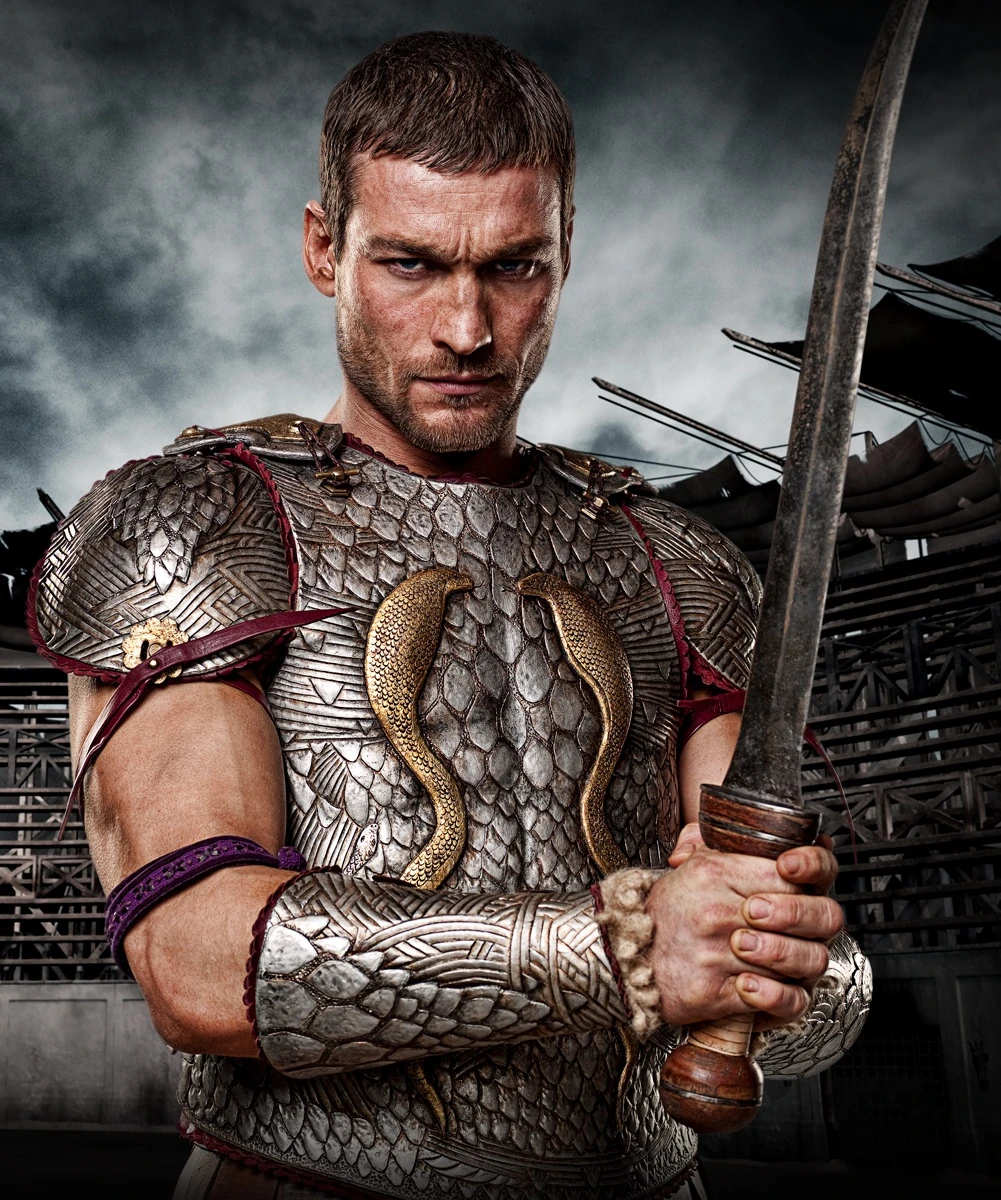Unveiling The Fascinating Character Names In Spartacus
Step into the world of Spartacus, where blood, glory, and unforgettable characters collide. If you're a fan of the series or just diving into the epic tale of rebellion, you'll soon discover that the names of the characters hold deep meaning and significance. These aren't just random monikers—they're carefully crafted to reflect the personalities, cultures, and fates of the people who populate this brutal yet beautiful world. So buckle up, because we're about to take a deep dive into the fascinating names that make Spartacus such a legendary series.
Now, if you've watched Spartacus, you already know that this isn't your average historical drama. It's a raw, unfiltered look at ancient Rome, filled with betrayal, passion, and rebellion. But what often gets overlooked is the brilliance behind the character names. Every name in Spartacus tells a story, whether it's rooted in history, mythology, or pure creative genius. And that's exactly why we're here—to peel back the layers and reveal the hidden meanings behind these names.
What makes this exploration even more exciting is how these names connect to the themes of the show. From Spartacus himself to the lesser-known characters, each name carries weight and purpose. This isn't just about linguistics; it's about understanding the artistry behind the storytelling. So whether you're a hardcore fan or just curious about the series, this article will give you a fresh perspective on the world of Spartacus.
Read also:Cynthia Erivo As Elphaba In Wicked Part 1 A Journey Through Magic And Stardom
Why Character Names Matter in Spartacus
Think about it—names are more than just labels. In Spartacus, they're a reflection of identity, culture, and destiny. For instance, the name "Spartacus" isn't just a random choice. It's steeped in history and carries the weight of a legendary figure who dared to challenge the Roman Empire. But it's not just the protagonist who gets the spotlight—every character, no matter how small, has a name that adds depth to the story.
Character names in Spartacus are like puzzle pieces that fit together to create a rich tapestry of meaning. They hint at the personalities of the characters, their origins, and even their ultimate fates. For example, names like "Crixus" and "Gannicus" sound fierce and powerful, which aligns perfectly with their roles as gladiators. Meanwhile, names like "Ilithyia" and "Lucretia" evoke a sense of elegance and sophistication, fitting for the Roman elite.
But why does this matter? Well, it adds another layer of engagement for viewers. When you understand the significance of a character's name, you gain a deeper appreciation for the show. It's like uncovering a hidden code that enhances your viewing experience. Plus, it shows just how much thought and effort went into crafting this epic tale.
Unpacking the Historical Roots of Character Names
Many of the character names in Spartacus have historical significance. Take Spartacus, for example. He was a real-life Thracian gladiator who led a massive slave revolt against the Roman Republic. The name "Spartacus" itself is believed to be of Thracian origin, and it's fitting for a man who became a symbol of resistance and freedom. Similarly, names like "Crixus" and "Gannicus" have roots in Celtic and Gaulish cultures, reflecting their origins as warriors from those regions.
On the Roman side, names like "Marcus Crassus" and "Julius Caesar" are instantly recognizable to history buffs. These figures weren't just fictional characters—they were powerful politicians and military leaders who played pivotal roles in shaping the Roman Empire. Even the names of lesser-known characters, like "Seppius" and "Cossutius," are historically accurate and add authenticity to the series.
By grounding the names in history, the creators of Spartacus ensure that the show feels grounded in reality. It's not just a fictional story; it's a retelling of real events, with each name carefully chosen to reflect its historical context.
Read also:Oregon Basketball The Heartbeat Of College Hoops In The Pacific Northwest
The Art of Naming in Spartacus
But it's not all about history. The creators of Spartacus also employed a bit of creative license when naming their characters. Some names are inspired by mythology, while others are purely imaginative. For example, "Agron" sounds like it could be a nod to the Greek god Ares, the god of war. Meanwhile, "Naevia" has a softer, more feminine quality, which fits her role as a skilled fighter with a complex personality.
Then there's "Oenomaus," whose name is derived from Greek mythology. In legend, Oenomaus was a king of Pisa who challenged suitors to a chariot race. If they lost, they were killed. It's a fitting name for a character who faces his own tragic fate in the series. And let's not forget "Ashur," whose name might be inspired by the ancient Assyrian civilization. Ashur's cunning and ruthless nature align perfectly with the historical connotations of the name.
This blend of history and creativity is what makes the naming in Spartacus so fascinating. It's not just about accuracy; it's about crafting names that resonate with the audience on multiple levels. Whether it's through mythological references or imaginative wordplay, each name adds something unique to the story.
Breaking Down the Names of Key Characters
Let's take a closer look at some of the most iconic names in Spartacus. We'll start with Spartacus himself. As we mentioned earlier, his name has Thracian origins, but it also carries a universal appeal. It's short, strong, and easy to remember—perfect for a leader of a rebellion. Then there's Crixus, whose name is thought to be of Celtic origin. It's a name that rolls off the tongue and perfectly suits his brash, confident personality.
On the Roman side, we have names like "Lucretia" and "Ilithyia." Lucretia's name is derived from the Latin word "lucrum," meaning profit or gain. This fits her role as a cunning manipulator who uses her position to advance her own interests. Ilithyia, on the other hand, is named after the Greek goddess of childbirth. Her name reflects her role as a woman of privilege and power, but also hints at her struggles with fertility and motherhood.
Even the supporting characters have names that tell a story. "Varro," for example, is a common Roman name that suggests his humble origins as a slave. Meanwhile, "Saxa" has a Germanic ring to it, which fits her role as a fierce warrior from the northern tribes. Each name is a clue to the character's identity and place in the world of Spartacus.
The Symbolism Behind Character Names
Names in Spartacus aren't just labels—they're symbols. They carry meaning and significance that go beyond the surface level. For example, the name "Spartacus" evokes images of strength, courage, and rebellion. It's a name that inspires awe and respect, which is exactly what the character represents. Similarly, names like "Crixus" and "Gannicus" convey a sense of power and ferocity, fitting for two of the most formidable gladiators in the series.
But it's not just the male characters who get symbolic names. Women like "Sura" and "Melitta" have names that reflect their roles and personalities. Sura's name is thought to be of Persian origin, which fits her exotic beauty and mysterious nature. Melitta's name, on the other hand, is derived from the Greek word for honeybee, symbolizing her industriousness and loyalty.
Even the villains in Spartacus have names that reflect their dark nature. "Glaber," for instance, has a harsh, guttural sound that fits his ruthless personality. Meanwhile, "Seppius" has a more refined quality, which suits his role as a cunning politician. These names aren't just random—they're carefully chosen to enhance the storytelling and deepen the audience's understanding of the characters.
How Character Names Reflect Their Destinies
One of the most intriguing aspects of character names in Spartacus is how they often foreshadow the characters' fates. For example, "Oenomaus" is doomed from the start, just like his mythological namesake. His tragic story is written into his name, making it all the more poignant when his downfall finally comes. Similarly, "Ashur" is a name that suggests both power and corruption, which aligns perfectly with his rise and fall in the series.
Then there's "Crixus," whose name might be a nod to the Celtic word for "king." This fits his ambition to become the leader of the rebellion, but also hints at his eventual downfall. Even "Spartacus" himself has a name that carries a sense of inevitability. As a legendary figure, his fate is sealed from the moment he steps into the arena. These names aren't just labels—they're prophecies that shape the characters' journeys.
By using names that reflect the characters' destinies, the creators of Spartacus add another layer of depth to the story. It's a subtle but powerful way of reminding viewers that these characters are more than just fictional creations—they're part of a grander narrative that transcends time and place.
The Impact of Character Names on the Audience
So why should you care about character names in Spartacus? Well, for one thing, they enhance your understanding of the show. When you know the meaning behind a name, you gain a deeper appreciation for the character and their story. It's like unlocking a secret code that adds richness to the viewing experience.
But beyond that, character names can also evoke emotions in the audience. A name like "Spartacus" inspires admiration and respect, while a name like "Glaber" evokes fear and loathing. These emotional responses are part of what makes Spartacus such a compelling series. The names aren't just words—they're tools that the creators use to manipulate our feelings and keep us engaged.
Finally, character names in Spartacus serve as a reminder of the importance of identity. In a world where slaves are stripped of their names and reduced to numbers, the act of naming becomes a powerful form of resistance. It's a way of reclaiming one's humanity and asserting one's place in the world. And that's something that resonates with viewers on a deeply personal level.
Final Thoughts on the Fascinating Character Names in Spartacus
As we've seen, the names in Spartacus are far more than just labels. They're windows into the characters' identities, cultures, and destinies. Whether they're rooted in history, mythology, or pure creativity, each name adds something unique to the story. So the next time you watch the series, pay attention to the names. You might just discover something new and fascinating about the world of Spartacus.
In conclusion, understanding the significance of character names in Spartacus enriches your viewing experience. It allows you to appreciate the artistry behind the storytelling and connect with the characters on a deeper level. So if you're a fan of the series, take the time to explore the hidden meanings behind these names. You'll be glad you did.
And now, it's your turn. What do you think about the character names in Spartacus? Do you have a favorite name or a theory about its meaning? Share your thoughts in the comments below, and don't forget to check out our other articles for more insights into the world of Spartacus.
Table of Contents
- Why Character Names Matter in Spartacus
- Unpacking the Historical Roots of Character Names
- The Art of Naming in Spartacus
- Breaking Down the Names of Key Characters
- The Symbolism Behind Character Names
- How Character Names Reflect Their Destinies
- The Impact of Character Names on the Audience
- Final Thoughts on the Fascinating Character Names in Spartacus
Article Recommendations
- Tyler Perry Jokes Hes So Sick Of This Old Broad When Asked About Madea Before Teasing Upcoming Movie


